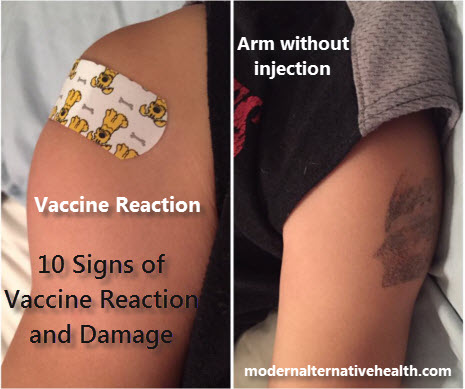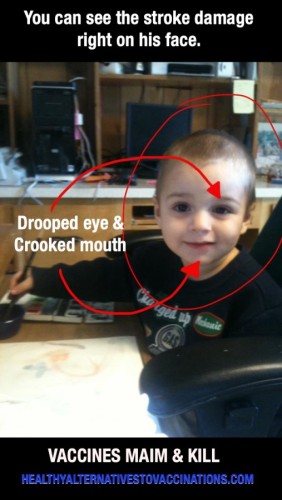You can’t find a more controversial topic than vaccines today. The CDC just released their 2016 Schedule, requiring over 70 vaccines by the age of 18. Considering one flu shot contains 250 times the amount of mercury the EPA considers liquid hazardous waste, it’s safe to say that any amount of vaccine can, and does, damage a child.
The debate is over, vaccines are toxic and damage your child’s health.
Before we move on, let’s tackle the “but how many?” issue. Your pediatrician and his handy marketing piece, the Vaccine Information Statement (VIS), will tell you that reactions are “one in a million.” The Vaccine Adverse Reporting System (VAERS) is where reactions are documented, although there are no requirements for doctors to do so, so the CDC itself admits the reaction statistics are more like 1-10% of the true numbers. In 2014, there were just under 37,000 reports filed filed.
Times that by 10 or 100. One in a million? Didn’t think so.
If you believe you’ve never seen a vaccine reaction, you probably truly have, but didn’t realize (or your doctor would not admit) that’s what you were seeing. Here we will go over the most common reactions (which are “normal” by how often they occur, but are by no means “normal” when your child swells up, seizes, or dies). Vaccine reactions can occur anywhere from immediately following vaccination, such as a swollen arm or leg, fainting or seizing, or for a month or more post vaccination. Research shows us the most critical days are days 5-7 and 14-16 post vaccination, where serious reactions are most likely to occur.
10 Signs of Vaccine Reaction and Damage
#1 High-Pitched Crying or Arching Back
High-pitched crying and discomfort, such as arching the back when laid down, is a clear indication of encephalitis, brain inflammation, which is a common vaccine reaction. Large amounts of bacteria, viruses, and toxins create a hyper- immune response, prompting severe, sometimes deadly, inflammation in the brain.
If your child will not sleep, is uncomfortable, and crying incessantly post vaccination (up to 21 plus days), take them to the emergency room immediately.
#2 Severe Swelling at Site
Severe inflammation at the injection site can be a sign of an allergic reaction or other hyper- immune reaction. Review the vaccine insert (before vaccinating) and try to outline what allergy (peanut, milk, egg) may have been created. If your doctor cannot explain what reaction occurred, then you should consider not vaccinating to prevent any further damage.
Read the vaccine insert before vaccinating, and be sure the doctor is using the correct method of injection. Injecting in the incorrect method can deliver a serious reaction.
10 Signs of Vaccine Reaction and Damage
Photo submitted by parent of vaccine injured child
#3 High Fever and/or Febrile Seizures
Tell me where in nature you would normally be exposed to upwards of ten bacteria and viruses at once? Nope, never. So when your child receives this many immune threats (accompanied by toxins) at once, your immune system goes into overdrive.
This can produce a very high fever, and if the fever moves up or down in temperature fast enough, a febrile seizure. Head to the emergency room, and demand a review of your child’s health if a febrile seizure or fever lasting over 3 days is seen post vaccination, as other vaccine reactions are likely occurring.

#4 Rash
A rash is simply a toxin leaving your body through your skin. A rash post-vaccination can be caused by the virus vaccinated against (measles, for example), or an allergic reaction producing eczema. If your child develops a rash, monitor the child for the symptoms of the vaccinated virus or bacteria, and consider eliminating any possible allergies created by the vaccine. Your child may also be detoxing the large quantities of adjuvants in the vaccine through the skin.
#5 Eczema, Allergies and Asthma
Vaccines were designed to sensitize your immune system to viruses and bacteria. Although many immunologists and doctors warn that this process does not work the same via muscular and blood injection versus introducing a substance through normal means of the mouth, nose, and eyes (to pass through your immune system process regularly and the vast immune system in your gut), many still trust in the theory of vaccination.
When you vaccinate, you are surely sensitizing your child to not only the bacteria and virus, but also the food and chemical additives in the vaccine, which include milk proteins, other human and animal proteins, egg, peanut and much more. If your vaccinated child develops eczema, allergies or asthma, which are all autoimmune responses to allergies, you need to consider stopping vaccination to not worsen the allergy.
#6 Anaphylaxis and Slowed Breathing Patterns
If your child’s breathing post vaccination (see suggestion below to get a breathing monitor and use overnight for at least one month following every round of vaccines, if you vaccinate) is delayed or slowed, it is cause to make a trip to the emergency room and check for allergic response or brain damage.
Anaphylactic shock is also a common vaccine reaction, where your airways (or other body systems) go into shock from an autoimmune, allergic response. If your child has responded in this way to vaccines, it is time to stop, and review the possible allergies created.

#7 Loss of Facial and Eye Symmetry and Itching/Numbness in Extremities
When your immune system responds to a threat, it produces more white blood cells. Your white blood cells are substantially larger than your red, and this becomes an issue when your immune system is kicked into overdrive and delivers large quantities of white blood cells to your smallest blood vessels, your capillaries. Your capillaries are so small that white blood vessels have to squeeze through one by one.
The smallest of these vessels are located in your hands, feet, nose and brain, particularly by the area which controls speech. When too many white blood cells are released, they cannot squeeze through and the blood and oxygen supply is limited for a period of time, and if severe enough, forever. This causes stroke in the brain, and can be seen by loss of facial asymmetry (one side of the face looks different than the other) and loss of tone around the eyes, cheeks, and mouth.
You would also feel this, if happening in your extremities rather your brain, as tingling, burning or numbing. Your child may not be able to articulate this to you, but if you see them generally uncomfortable, struggling with using those parts, or pulling at the parts, I would consider a possible reaction and a trip to the emergency room.
1
Photo submitted by parent of vaccine injured child and Healthy Alternatives to Vaccines
#8 Bacterial or Viral Infection
As noted above, vaccines are designed to sensitize your system to a bacteria or virus. Theoretically, every time you vaccinate, you get that bacterial or viral illness. If your child falls ill post vaccination, bring them back to your pediatrician and demand that the child be examined for the illness against which they were vaccinated. It’s likely that your doctor will ignore your requests and be adamant that the vaccine cannot cause the disease.
Vaccine-strain illnesses, such as asymptomatic measles, are often more serious than the wild version of the disease, so you need to be extra vigilant and require the doctor to treat your child. (If your doctor refuses, take your child to another doctor or to an emergency room. Pride is not a valid reason to not treat a child).
#9 Vomiting and Diarrhea
Since your child will be receiving the bacteria or viral illness vaccinated against, as well as a load of other toxins and allergenic substances, their bodies will try to detox these substances post vaccination. This is a vaccine reaction. If your child exhibits vomiting or diarrhea for a day or more post vaccination, have your doctor or an emergency room evaluate the child for the diseases against which they were vaccinated (and treat them for dehydration and the disease).
#10 Behavioral Changes, Attention and Aggression Issues
A normally functioning child does not regress (lose speech, lose eye contact and social interaction) for no reason. Heavy metal toxicity, loss of oxygen to critical areas of the brain and a body in constant hyper-immune response lead to a child who cannot function and develop.
If you notice your child losing abilities once mastered, exhibiting attention or aggression issues, or withdrawing from social interaction, you are likely viewing a vaccine reaction. The good news is that there are many natural ways to detox and heal vaccine damage. Check out The Thinking Mom’s Revolution if this has happened to your child, and explore how you can truly heal against heavy metal, vaccine damage.
If your child has had a vaccine reaction, it’s never too late to research vaccines and choose to build natural immunity and a healthy lifestyle instead. You should also look into detoxing from the vaccine toxins. If you still choose to vaccinate, consider a delayed schedule and using a breathing monitor.
If you suspect damage, do not take “this could not be from the vaccine you had 3 days ago” from your doctor. Your child deserves better than a denial of clear symptoms because of pride. Find a doctor who is willing to help you, even if it’s a chiropractor, naturopath, or biomedical doctor.
Have you or your child had a vaccine reaction? How did you heal from it?
Disclaimer: I am not a doctor (yet), but you should find one you trust that understands, listens and treats you how you’d like. Do not tolerate medical bullying. This is not intended to be medical advice nor to treat, cure, diagnose nor prevent any disease. Please make your medical decisions with research, a trusted physician, and common sense.










Sign up on lukeunfiltered.com or to check out our store on thebestpoliticalshirts.com.